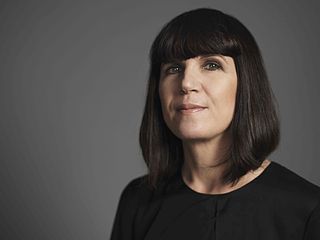A Quote by Deborah Tannen
One of the first studies in the field of gender and language, by Don H. Zimmerman and Candace West in 1975, found that in casual conversations between women and men, women were interrupted far more often.
Related Quotes
Many women, particularly young women, have claimed the right to use the most explicit sex terms, including extremely vulgar ones, in public as well as private. But it is men, far more than women, who have been liberated by this change. For now that women use these terms, men no longer need to watch their own language in the presence of women. But is this a gain for women?
It's true that in a lot of western feminist movements, you see women working singularly from men. Suffragettes and the women's rights movement in the 60s here, but when I think of the Islamic feminist movement, I think of a lot of men who are very much standing with the women. It really feels like in equal numbers. Women are catching up in the field because we were not given access to knowledge and encouraged into these studies and so these men are helping us and empowering us. They are men of conscience who are fed up with this assumption that they're entitled.
It was long assumed that heart disease manifested the same in men and women. But Dr. Legato found that men may experience the classic symptoms of chest pain that radiates down the left arm. Women often have symptoms including shortness of breath, nausea or vomiting, and back or jaw pain. A gender-neutral approach left many women under-diagnosed and under-treated and as a result many women died needlessly.
Back in the days when men were hunters and chest beaters and women spent their whole lives worrying about pregnancy or dying in childbirth, they often had to be taken against their will. Men complained that women were cold, unresponsive, frigid... They wanted their women wanton. They wanted their women wild. Now women were finally learning to be wanton and wild - and what happened? The men wilted.
I hadn't thought about the balance in mood. You see that we did it in alphabetical order, so if there's any kind of shape, or any kind of flow, it's random. Gender...we didn't think much about it. It was sort of interesting to see that women often were choosing women and men often were choosing men. And sometimes they wouldn't and that was fun. I didn't know that I would be excited by that, until I saw it happen.
I think that it is true that for me as I observe it, that the Western World tends to be more of , tends to encompass more of, the masculine energy of the planet itself, the planet's population. Whereas the Eastern part of the world tends to encompass more of the planet's population's feminine aspects. And for those reasons the East and the West tend to approach God very much as men and women do. So the differences between East and West are the differences between men and women, largely.
They wanted black women to conform to the gender norms set by white society. They wanted to be recognized as 'men,' as patriarchs, by other men, including white men. Yet they could not assume this position if black women were not willing to conform to prevailing sexist gender norms. Many black women who has endured white-supremacist patriarchal domination during slavery did not want to be dominated by black men after manumission.
U.N. Women was created due to the acknowledgement that gender equality and women's empowerment was still, despite progress, far from what it should be. Transforming political will and decisions, such as the Member States creating U.N. Women, into concrete steps towards gender equality and women's empowerment, I think is one of the main challenges.
It just struck me as really odd that there were all of these conversations going on about what young women were up to. Were young women having too much sex? Were young women politically apathetic? Are young women socially engaged or not? And whenever these conversations were happening, they were mostly happening by older women and by older feminists. And maybe there would be a younger woman quoted every once in a while, but we weren't really a central part of that conversation. We weren't really being allowed to speak on our own behalf.
If you just look at the number of roles for women versus the number of roles for men in any given film, there are always far more roles for men. That's always been true. When I went to college, I went to Julliard. At that time - and I don't know if this is still true - they always selected fewer women than men for the program, because there were so few roles for women in plays. That was sort of acknowledgment for me of the fact that writers write more roles for men than they do for women.



































